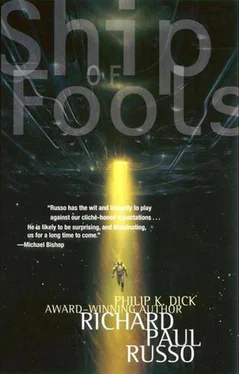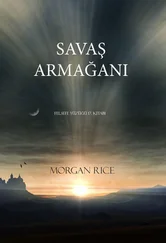But what would I have said? The dwarf knew far too much.
THEnext day we went into geosynch orbit around Antioch, directly above the source of the transmission. Satellite probes were launched; final preparations were made. All or nothing, Nikos had said. He was right, and I was ready.
THEsmall ship fell out of the clouds. Came down shaking and shimmying in the wind currents, turbulence that diminished as we dropped farther and then swung around into a more gradual descent. I felt queasy all the way down.
The shuttle was tiny compared to the Argonos , of course, but large enough to comfortably hold the landing team of thirteen, two pilots, two armored terrain vehicles, and a smaller, faster, and more maneuverable flyer capable of making further exploratory surveys of the planet.
We watched our descent on video monitors mounted in the ceiling around the cabin, choosing from among several different views of the ground, the sky, even the surface of the shuttle itself. The shuttle’s skin was coruscating metal, color and texture changes popping chaotically across its surface. Every so often it all snapped into focus, a perfect camouflage against the terrain below, but then the focus burst apart and the chaos returned. Once, decades or centuries earlier, that metal skin worked perfectly, providing three-dimensional camouflage, making the shuttle almost invisible from any vantage point; but like so many other things on the ship, it functioned sporadically, and no one knew how to repair it.
The terrain below was awash in the orange glow from the rising sun, the sun’s rays cutting in under dissipating clouds. A muddy river snaked through densely wooded flat-lands, the woods bordered several kilometers to the west by a ragged range of foothills that in turn gave way to higher, stony mountains scarred by swaths of burned trees and vegetation. No signs of smoke rose from the charred stumps, the spikes and spines of blackened wood. A herd of large, mottled beasts moved through the devastation.
Down by the river, a large section of the woods had been cleared, and in that clearing was a town, dozens of low buildings, roads and pathways and other artificial structures. There was no movement in the town except for leaves and bits of flotsam blown about by the wind, a few pieces of cloth flapping from their places of attachment. But no creature moved, unless it was inside a building and out of sight. How likely was that?
We approached the town, descending more slowly now, arcing around it. Finally, over an open space just back from the river—a flat rectangle of dirt partially fenced—the shuttle shifted into a hover. Stationary for several moments, we began a slow vertical descent with loud, wailing noises from the shuttle’s engines. The dust below us boiled and swirled until the shuttle touched down. The wailing faded, the engines shut down, and eventually there was silence.
We waited for an hour or so while sensors and probes were dispatched and data was transmitted back to us. When everything checked out as we’d expected, we readied ourselves, masking our faces with breathers. The shuttle’s belly opened up and dropped down, a wide ramp leading to the ground. A few minutes later, led by the soldiers, we walked down the ramp, and took our first steps on that alien world.
THEREwas no one left alive. We had not expected to find anyone, but the desolation of the settlement was surprisingly grim, and I could feel the emptiness as I stood near the shuttle, looking out at the buildings. A pall rapidly settled over us, worked its way into our bones so that it became impossible to dispel. A discomforting stillness hung over the area, as if there was nothing alive; no humans, no animals, not even tiny creatures like insects.
I noticed the light more than anything else. It was like nothing on the Argonos , even in the largest of the nature rooms that tried to re-create natural environments. Not brighter, but more intense somehow, so that everything around us seemed to have the faintest hint of shining outlines. I had forgotten what real sunlight could be like.
The soldiers insisted on leading the way as we left the fenced landing area. Our first task was to find the source of the transmission. Barry Sorrel, the head of the science team, had some instrument that homed in on the signal; we followed him through the buildings, along rutted pathways. I searched each structure we passed for signs of life, but everything was dead and quiet, abandoned or forgotten.
The transmitter was on top of a building near the center of the town, powered by surrounding arrays of solar panels. No way to know how many decades it had been pulsing out its steady, meaningless transmission. Andrew Thornton wanted to destroy the transmitter—out of pique, I think. But the science team wanted to take a closer look at it over the next few days, see if there were codes or messages stored somewhere, anything more meaningful.
We were not a military-minded group, and after we found the transmitter, we began to disperse—the science team members stayed together, though they ignored the soldiers; Sari Mandapat and Father Veronica drifted toward the outer edges of the settlement; Thornton stuck with two of the soldiers; and I went off on my own.
I was the first to find bones. Down near the river was a rectangular building of rotting wood, the sunlight slashing through cracks and jagged holes and broken windows. I stood in the doorway, watching dust luminesce in the beams of light, when the bright white curves of a rib cage caught my eye.
We spent most of the rest of the day making a general search of the settlement, through all the buildings that were easily accessible. We found the remains of at least a few of those who had once lived here. Only bones. No flesh remained. Four skeletons mostly complete and completely bare except for an occasional shred of colored fabric or bands of plastic or metal, oxidized rings circling white finger bones. The scattered pieces of two or three others, perhaps. Once we had gone through the entire settlement, we began collecting all the skeletons, partial or whole, every bone that looked like it might be human. The science team examined the bones as we collected them, particularly the complete skeletons, but it soon became clear there was no way to glean even a clue to the reasons any of them died—there were no obvious signs of trauma, no shattered and strangely disintegrating skulls, no unusual lesions.
In an open area near the woods, the soldiers blew open a small pit with explosives and stone burners; then we carefully laid the skeletons and bones on the bottom.
Father Veronica stood at the edge of the pit, gazing down at bones and earth. She made the sign of the cross, and began to speak.
“ Absolve, Domine, animus omnium fidelium defunctorum ab omni vinculo delictorum. Et gratia tua illis succurrente…”
A dead language spoken for the dead. None of us understood what she was saying, and if the dead could have heard, I’m sure they would not have understood, either; they couldn’t hear, so perhaps it didn’t matter.
But I was certain Father Veronica understood what she was saying, for there was strong emotion in her voice, a sadness eased by hope, a comfort and acceptance.
“…Dies illa, dies irae, calamitatis et miseriae; dies magna…”
We were all silent, standing along the edge of the pit on either side of her, gazing down along with her on all those bones. She was beautiful, and in a way magnificent, and my admiration for her grew as I watched and listened.
“…Kyrie, eleison… Christe, eleison… Kyrie, eleison.”
She once again made the sign of the cross, and this time everyone except me joined her.
Читать дальше












